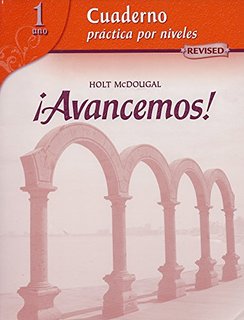
All Solutions
Page 300: Gramatica C
Remember that **the verb matches the subject in person and number.** This is how you will know which form of the verb to put.
Look at the table below to see the endings for **-er** and **-ir** verbs in the preterite:
|Singular |Plural |
|–|–|
|Yo **-í** |Nosotros **-imos**|
|Tú **-iste**|Ustedes **-ieron** (Mexico)|
|Él/Ella **-ió**|Ellos/Ellas **-ieron**|
The verb from the box that fits here is *recibir (to receive)*. The subject is “my baseball team” and is third-person singular, so we need the third-person singular form of *recibir*, which is **”recibió.”**
*Mi equipo de béisbol recibió…*
The verb from the box that fits here is *salir (to go out).* The subject is first-person plural (we), so we need the first-person plural form of the verb *salir,* which is **”salimos.”**
*Nosotros salimos…*
Verb *correr (to run)* fits perfectly in this sentence. The subject is first-person singular (I). When we conjugate the verb *correr* to get the first-person singular form in the preterite, we get **”corrí.”**
*Yo corrí…*
A perfect fit for this sentence is the verb *perder (to lose)*. The subject is third-person plural (they). When we conjugate the verb *perder* to get the third-person plural form, we get **”perdieron.”**
*Juan y Ariel no perdieron…*
The verb from the box that fits here is *compratir (to share).* The subject is first-person plural (we), so we need the first-person plural form of the verb *compartir,* which is **”compartimos.”**
*Entonces, nosotros compratimos…*
1. recibió
2. salimos
3. corrí
4. perdieron
5. compratimos
You were given some verbs and should form grammatically correct sentences. Answers may vary, but the important thing is that you **match the verb with the subject in person and number.**
Look at the table below to see the endings for **-er** and **-ir** verbs in the preterite:
|Singular |Plural |
|–|–|
|Yo **-í** |Nosotros **-imos**|
|Tú **-iste**|Ustedes **-ieron** (Mexico)|
|Él/Ella **-ió**|Ellos/Ellas **-ieron**|
*(My friends and I saw a good movie yesterday.)*
The subject is first-person plural (we), so we used the ending for the first-person plural (**-imos**) to the verb we chose. We used the verb *v**er** (to see)* in this sentence.
You can choose another verb, but the ending stays the same. This applies to all of the sentences.
*(The guys from the team ran a lot on the field.)*
The subject is third-person plural (they), so we put the ending for the third-person plural (**-ieron**) to the verb we chose. We chose the verb *corr**er** (to run)*.
*(I lost my backpack.)*
The subject is first-person singular (I), so we put the ending for the first-person singular (**-í**) to the verb we chose. We used the verb *perd**er** (to lose)* in this sentence.
*(Did you understand the rules in volleyball?)*
The subject is second-person singular (you), so we added the ending for the second-person singular (**-iste**) to the verb we chose. We chose the verb comprend**er** (to understand).
*(The team received a big applause.) *
The subject is third-person singular (it); therefore, we pit the ending for the third-person singular (**-ió**) to the verb we chose. We used the verb *recib**ir** (to receive).*
You should write sentences about a soccer game that happened in the past. Use the sentences below as a reference.
N.B. Remember that **the verb matches the subject in person and number.**
*(Last week, my soccer team played an important game.)*
The subject is third-person singular (it), so we used the third-person singular form of the verb *jugar (to play*). which is *”jugó.”*
*(We ran a lot in that game.)*
The subject is first-person plural (we), so we used the first-person plural of the verb *correr (to run)*, and got *”corrimos.”*
*(My friends watched the game.)*
The subject is third-person plural (they), so we used the third-person plural form of the verb *ver (to see/to watch)*, and got *”vieron.”*

